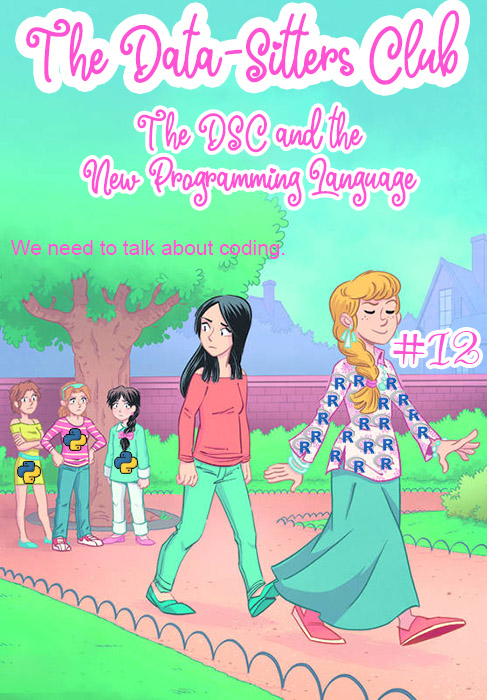The first month of the quarter has been busier than I imagined, kicking off a new class of the DH RPG (Project Management and Ethical Collaboration for Humanists) and wrapping up a paper on the history of technical infrastructure for multilingual publishing (tl;dr honestly, handwriting is still easiest and most drama-free, though with Unicode and OpenType we're getting better.)
With those wrapped up, I've been able to knock off a few lingering things on the to-do list, including getting DOIs for the Data-Sitters Club books. Programming Historian was an inspiration here, as a long-running digital serial publication that's managed to get DOIs for all its lessons. I made some inquiries locally about what might be possible, knowing that DOIs could be minted for things submitted to our institutional repository, which led to some productive myth-busting conversations. The policy had been that DOIs could be minted for digital publications (not just repository submissions), but only ones hosted by Stanford and at a stanford.edu domain. Shifts in the hosting landscape have meant that not everyone uses a stanford.edu domain for their projects, and not all stanford.edu domains resolve to Stanford-hosted websites; GitHub pages, for instance, is a popular option that we also use for the Data-Sitters Club. The concern, understandably, is that DOIs are permanent, and you don't want broken URLs for DOIs, even if the website is no longer maintained. So I worked out an arrangement with Hannah Frost, our Associate Director for Digital Library Services: I'd deposit a PDF for each DSC book into the repository, fill out all the metadata (including a link to the live DSC book page on our website), and on the back end they'd switch the DOI pointer to go to the DSC website. Then, if something happens to the DSC website someday, they'd be able to revert the links to the PDF version as a guaranteed backup.
The PDF-ification of the DSC books was pretty easy, since JupyterBook has a "download as PDF" button built in. What took longer was futzing with the CSS to hide some screen-oriented artifacts that showed up in the PDF version in a way that covered some of the actual text. CSS is perhaps my least-favorite thing to wrangle, but as usual, when I sat down to do it, it was less of a nightmare than I was expecting.
The whole process, for 24 of our 25 books (yeah, I somehow missed #11 -- will remedy that soon!), took a couple hours, but had the positive scholarly communications side effect of getting one of the Data-Sitters and a guest Data-Sitter to sign up for an ORCID.
Now that it's done, and we have a process in place for future books, it feels surprisingly good to know that this little project that's found its way onto syllabi and other reading lists has some version preserved for the long haul, that we can credit people in a more visible way via ORCID, and that it is more formally part of a broader network of digital publications through having DOIs. In March, we should also be able to get it cataloged with a MARC record so that the Data-Sitters Club will show up in our online library catalog, and your library can add it too. I was a little skeptical it would work out, but I'm grateful to Hannah for her flexibility and creative problem-solving here, and Amy Hodge for doing the back-end data shoveling to make all the pieces work. If you've got a DH project that looks like a publication, it's worth reaching out to your schol com and/or institutional repository folks to see if you can do something similar.
